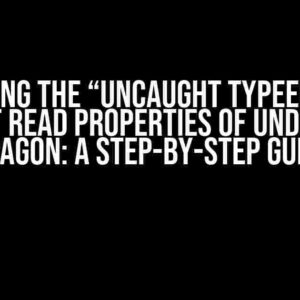The Error That’s Got You Stumped
Ah, the infamous C5275 error message. You’ve probably encountered it while trying to compile your code, only to be left scratching your head, wondering what on earth it means. Fear not, dear developer, for we’re about to embark on a journey to unravel the mystique surrounding this enigmatic error.
What is the C5275 Error?
The C5275 error is a compiler error that occurs when the compiler encounters an issue with the code. Specifically, it’s related to the __declspec(allocator) construct, which is used to specify the allocation model for a function.
// Example code that might trigger the C5275 error
__declspec(allocator) void* MyAlloc(size_t size) {
return malloc(size);
}
Symptoms of the C5275 Error
When you encounter the C5275 error, you might see an error message that looks something like this:
error C5275: 'MyAlloc': __declspec(allocator) cannot be applied to a function that returns a 'void *'
Don’t worry if this message seems cryptic – we’ll break it down together.
The Causes of the C5275 Error
So, what exactly causes this error? Let’s explore the common culprits:
-
Incorrect use of __declspec(allocator)
The most common cause of the C5275 error is the misuse of the
__declspec(allocator)construct. This attribute is meant to be used with functions that return avoid*, but it’s often used incorrectly or in the wrong context. -
Return type mismatch
Another common issue is a mismatch between the return type of the function and the expected type. For example, if the function returns a
int*instead of avoid*, you’ll get the C5275 error. -
Conflicting compiler options
Sometimes, conflicting compiler options can cause the C5275 error. This might happen when you’re using different optimization levels or compiler flags that clash with each other.
Resolving the C5275 Error
Now that we’ve identified the potential causes, let’s get down to business and fix this error! Follow these step-by-step instructions to resolve the C5275 error:
Step 1: Review Your Code
Take a closer look at the code that’s causing the error. Check for any syntax errors, typos, or incorrect usage of the __declspec(allocator) construct.
// Example code with correct usage of __declspec(allocator)
__declspec(allocator) void* MyAlloc(size_t size) {
return ::operator new(size);
}
Step 2: Verify Return Type Compatibility
Make sure the return type of the function matches the expected type. In this case, the function should return a void*.
// Example code with correct return type
__declspec(allocator) void* MyAlloc(size_t size) {
return static_cast<void*>(new char[size]);
}
Step 3: Check Compiler Options
Review your compiler options to ensure they’re not conflicting with each other. Try compiling your code with different optimization levels or flags to see if the error persists.
// Example compiler command with adjusted flags
cl /c /O2 /MTd mycode.cpp
Step 4: Clean and Rebuild
Sometimes, a simple clean and rebuild can resolve the issue. Try deleting the intermediate files and rebuilding your project from scratch.
// Example clean and rebuild command
nmake clean
nmake
Troubleshooting Tips and Tricks
If the above steps don’t resolve the issue, here are some additional tips to help you troubleshoot the C5275 error:
-
Check for compiler version compatibility
Ensure that your compiler version is compatible with the code you’re trying to compile.
-
Verify header file inclusion
Make sure you’ve included the necessary header files, such as
<new>, which provides the::operator newfunction. -
Look for conflicting definitions
Check if there are any conflicting definitions of the
__declspec(allocator)construct or the function causing the error. -
Consult the documentation
Conclusion
The C5275 error might seem daunting at first, but with these steps and troubleshooting tips, you should be able to resolve the issue and get your code compiling smoothly. Remember to take a step back, review your code, and verify the compiler options and return type compatibility.
| Error Code | Meaning | Solution |
|---|---|---|
| C5275 | __declspec(allocator) cannot be applied to a function that returns a ‘void *’ | Review code, verify return type compatibility, and check compiler options |
Additional Resources
For more information on the C5275 error and related topics, check out these resources:
- Microsoft Documentation: Compiler Error C5275
- Stack Overflow: C5275 error with __declspec(allocator)
- CodeProject: Error C5275 when using __declspec(allocator) in C++
Now, go forth and conquer that C5275 error!
Frequently Asked Question
Encountering errors can be frustrating, especially when you’re in the middle of a critical project. One such error that may leave you scratching your head is C5275. Worry not, dear developer, for we’ve got the answers to your burning questions!
What does the C5275 error message mean?
The C5275 error message typically indicates that the compiler is unable to find the required external symbols or functions. This can occur when there’s a mismatch between the declaration and definition of a function, or when a library or object file is missing.
How do I fix the C5275 error in Visual Studio?
To resolve the C5275 error in Visual Studio, ensure that you’ve included all the necessary library files and that the function declarations match their definitions. Also, check that the library files are correctly linked to your project. If you’re still stuck, try cleaning and rebuilding your project.
Can C5275 error occur due to missing DLL files?
Yes, a missing DLL file can indeed cause the C5275 error. When a DLL file is missing, the linker is unable to find the required external symbols, leading to this error. Make sure all the necessary DLL files are present in the correct directory and that the path is correctly set in your project settings.
How do I check for duplicate symbol definitions?
To check for duplicate symbol definitions, examine your code for multiple definitions of the same function or variable. You can also use the `/VERBOSE` linker option to get more detailed output, which can help you identify the duplicate symbol. Additionally, you can use tools like DumpBin or Dependency Walker to inspect the content of your object files and libraries.
Is C5275 error specific to a particular compiler or platform?
The C5275 error is specific to the Microsoft C/C++ compiler (cl.exe) and is typically encountered on Windows platforms. However, similar errors can occur with other compilers and platforms, and the troubleshooting steps mentioned above can be adapted to resolve those issues as well.


